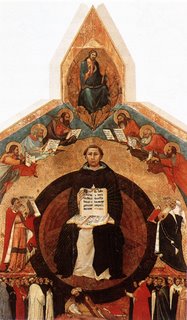
Aquinas' debts to Augustine and Anselm are obvious, but he was determined to go beyond them and establish a clear distinction between the two divine 'processions', generation and procession (in the classical sense). 'Generation' was defined by Aquinas as an (intellectual) act of conception which produced its like, i.e. the Father reproduced his own likeness in the Son. 'Procession' he defined as an impulse of the divine will, which brings forth something other than a straightforward reproduction of itself. When this impulse is perfect, as it must be within the Godhead, the resulting product will also be fully God. Hence there is a real difference between the Son and the Holy Spirit, both of whom are fully God, although once again the Spirit fits only somewhat uncomfortably into what is basically an Augustinian model of the Trinity.
Not content to stop there, Aquinas used the terms 'paternity', 'filiation' and 'procession' to describe the divine relations. He distinguished them from the essence of God by saying that the former are relative, while the latter is absolute. His abstractions differ from those of the Cappadocians, for whom unbegottenness, begottenness and procession were the absolute distinctions of the hypostases. But like them, he has succumbed to a tendency towards philosophical abstraction which is very different from the spirit of the New Testament. The full effect can be seen in Thomas' definition of the word 'person'. As far as he was concerned, person was an aspect of a nature which signified what was distinct in that nature. Because distinction in God is only by relations of origin, a divine person is defined by Aquinas as a subsistent relation in the being of God. In other words, 'person' and 'relation' are synonymous, which means that one might easily dispose of the unphilosophical term 'person' and speak only of (Aristotelian) relations in God.
The trinitarianism of Anselm and Aquinas can rightly be criticized for being too philosophical, too abstract, and even reactionary, in the sense that it is dependent on the primacy of nature over person -- almost inevitable in any philosophical theology, but directly counter to the spirit of Chalcedonian christology. Unfortunately, christology and trinitarian theology tended to go their separate ways during the high Middle Ages, and they are still not always closely linked even today.
--Gerald Bray, The Doctrine of God (IVP, 1993), pp. 182-3

2 comments:
You know, I have a question regarding a "tendency towards philosophical abstraction which is very different from the spirit of the New Testament." I have long opined that the theological task is one of translation: translating the truth of the Gospel into the language of the hearer. This included the effort to describe the Gospel in the hottest new philosophical language of the day - Aristotle for Aquinas, neo-Platonism for an earlier generation, and existentialism for a later - in the process of faith seeking understanding. I appreciate that the New Testament is primarily witness and not so much "systematic theology" (John and perhaps Hebrews notwithstanding), but I don't think that would disqualify subsequent efforts at translation for new generations. Am I not catching your emphasis?
Hi Marshall,
This mild reluctance towards philosophical abstraction runs throughout Bray's work, which is attempting to offer a distinctively Evangelical perspective and approach to the Doctrine of God by focusing on revelation as the sole source for theology. In this Bray is only moderately successful, but in the end he is forced to give credit where credit is due, which means that he is dependent upon the Nicene terminology to explain what is revealed in the New Testament.
Post a Comment